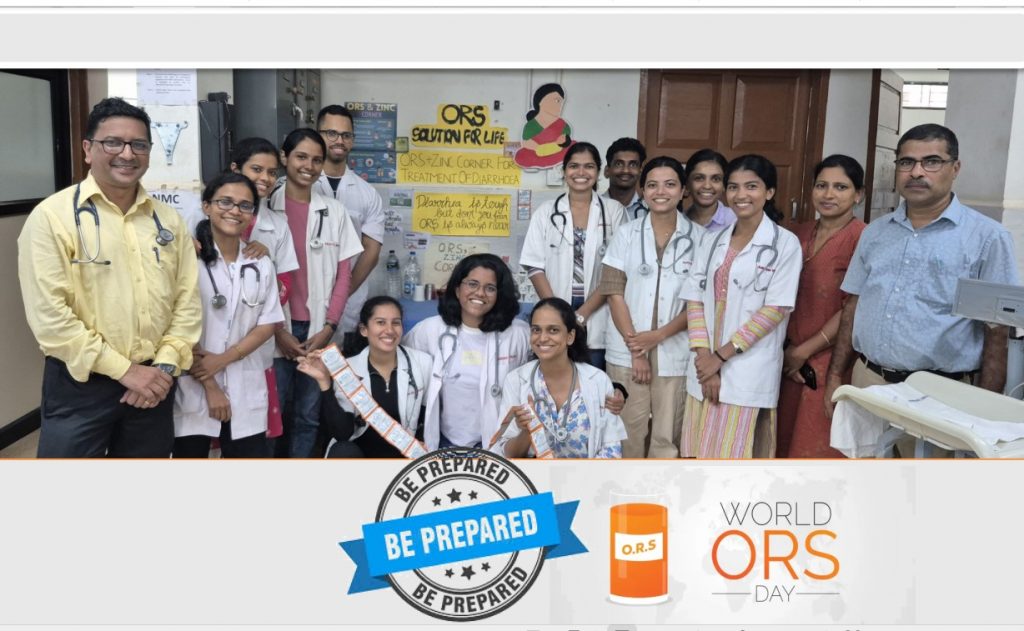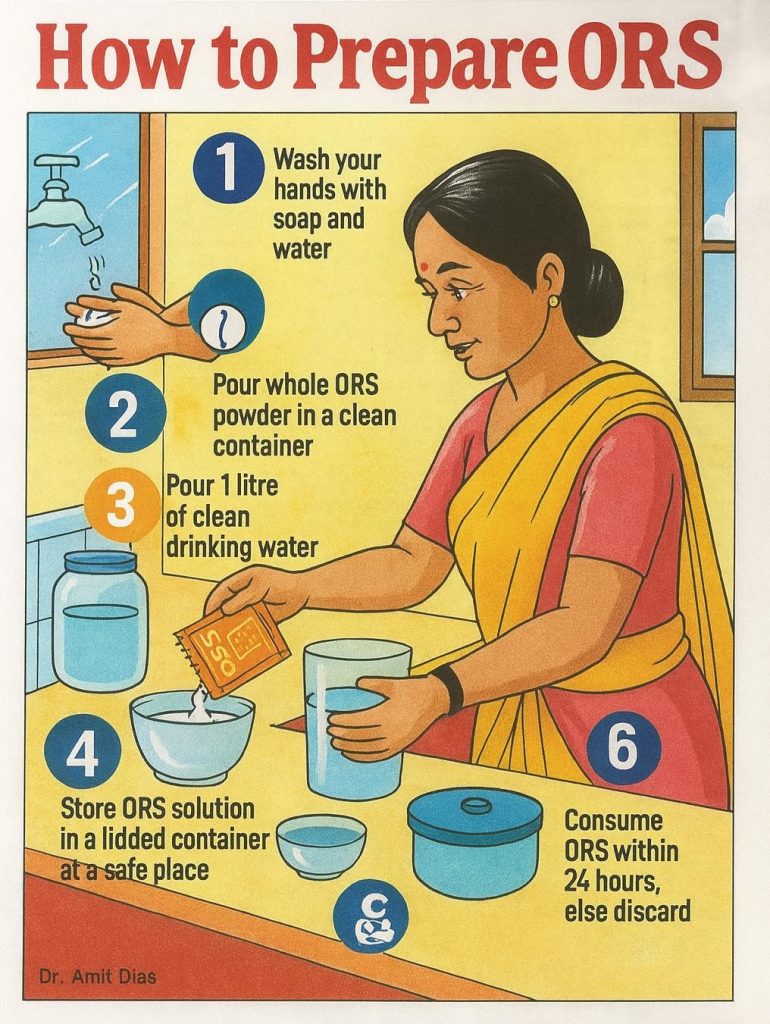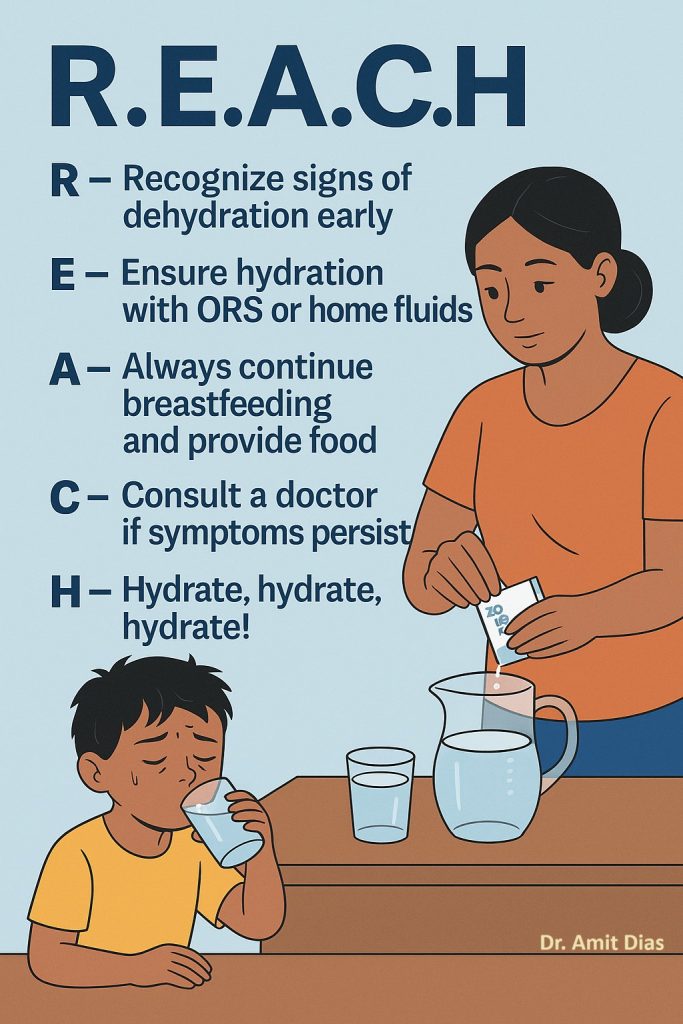Goa is abuzz with excitement as vintage bike and car owners, users, collectors and fans are decking […]

ORS – A SOLUTION FOR LIFE! By Dr Amit Dias, MD
July 19- July 25, 2025, MIND & BODY, HEART & SOUL July 18, 2025Celebrated on July 29 every year, World Oral Rehydration Salts (ORS) Day draws attention to one of the simplest and most impactful innovations in modern medicine that saves lives. “We are using it not only to deal with dehydration due to diarrhoea but also manage patients with dengue,” says Dr Amit Dias as he explains why it is called the solution for life.
EVERY year on July 29 the world observes World ORS (Oral Rehydration Salts) Day, a recognition of one of the simplest yet most powerful medical interventions in public health. The day was initiated by the Indian Academy of Pediatrics in 2001 with the goal of reducing deaths due to childhood diarrhea — a condition that continues to claim hundreds of thousands of young lives annually, especially in low- and middle-income countries. It is also used in correcting dehydration in people with dengue, heat stroke and other health conditions.
World ORS Day is marked on July 29 in remembrance of Dr Dilip Mahalanabis, who demonstrated the effectiveness of ORS during a deadly cholera outbreak. Necessity is the mother of invention and Dr Mahalanabis prepared the salt and sugar solution as they ran out of IV fluids, while dealing with an outbreak of cholera amongst refugees. He found that the magic mixture helped in correcting dehydration and preventing death. His work has since been recognized globally, and his legacy lives on through each life saved by a packet of ORS. The theme this year is — “ORS: A Solution for LIFE.”
According to WHO and UNICEF, diarrheal disease remains one of the leading causes of death among children under five, responsible for more than 500,000 deaths every year. In India alone, ORS is credited with saving nearly 5 million children’s lives. Despite its simplicity, the solution has been called “the most important medical advance of the 20th century.”

UNDERSTANDING ORS
ORAL Rehydration Solution (ORS) is a medically formulated fluid designed to replace the water and essential salts lost from the body during diarrhea. It is especially effective in preventing and treating dehydration, which is the most dangerous consequence of diarrhea. Even as we face the epidemic of dengue in our state, the ORS pack is our best weapon to fight dehydration.
WHO-Recommended Composition per Liter:
Glucose – 13.5 g
Sodium chloride – 2.6 g
Trisodium citrate – 2.9 g
Potassium chloride – 1.5 g
This precise combination enables the body to absorb fluids more efficiently through the intestines, making ORS a lifesaver.
HOW TO PREPARE & USE ORS
PRE-PACKAGED ORS sachets are available at PHCs, CHCs and Health and Wellness Centers under the Ayushman Bharat initiative. To prepare, mix the entire sachet in 1 liter of clean water — not more, not less. Use the solution within 24 hours and discard the rest.
Home-made ORS (when packets aren’t available):
Mix 6 level teaspoons of sugar and half a level teaspoon of salt in 1 liter of clean and boiled water.
Precautions:
- Never increase salt or sugar beyond recommended levels.
- Always use clean, safe water.
- Prepare fresh ORS daily. Discard the old solution after 24 hours.
CHILDREN ARE NOT MINI ADULTS!
ONE should be very careful with infants and newborns. Children, especially infants, are more vulnerable to dehydration. A single episode of diarrhoea can dehydrate them — they are not mini adults. Their smaller body weight and faster fluid loss means that even mild diarrhea can rapidly escalate into a life-threatening condition. Children need to be given small, frequent sips of ORS after each episode of diarrhea — not just when they’re visibly thirsty.
WHAT IS DIARRHEA?
DIARRHEA is defined medically as the passage of three or more loose or watery stools within a 24-hour period. It should not be confused with frequent passage of normal stools or a single episode of loose motion.
Diarrhea is most often caused by infection, poor sanitation, or unsafe water, and is highly preventable and treatable.
SIGNS OF DEHYDRATION
Recognizing dehydration early is key. Look for:
- Dry mouth and tongue
- Sunken eyes
- No tears while crying
- Reduced urination
- Irritability or lethargy
- In infants: sunken soft spot (fontanelle)
Severe dehydration can cause shock, unconsciousness and death if untreated.
THE IMNCI APPROACH
The Integrated Management of Neonatal and Childhood Illness (IMNCI) program in India provides a systematic method for managing diarrhea in children:
- Plan A: Home treatment with ORS for mild dehydration
- Plan B: ORS at health centers for moderate dehydration
- Plan C: IV (Intra venous) fluids and hospitalization for severe dehydration.
ORS is considered as “appropriate technology because it is inexpensive
and easy to administer - Requires no specialized infrastructure
- Scalable in low-resource settings
THE REACH STRATEGY FOR FAMILIES
Here is a simple way to remember what to do and REACH out to those with diarrhoea or vomiting. To empower caregivers, health professionals now promote the REACH approach:
- R – Recognize signs of dehydration early
- E – Ensure hydration with ORS or home fluids
- A – Always continue breastfeeding and provide food
- C – Consult a doctor if symptoms persist
- H – Hydrate, hydrate, hydrate!
This simple message can be a life-saving checklist during episodes of diarrhea.
When ORS is not readily available, some safe and effective home fluids include: - Rice water
- Coconut water
- Lemon water with sugar and salt
- Buttermilk with a pinch of salt
- Dal water or clear soups
These are temporary solutions until ORS can be accessed. They do not substitute for ORS.

Why zinc is added in Diarrhea Management?
THIS is one of the newer strategies. The theme for ORS day in 2022 was Jodi number one: ORS & Zinc. Zinc is known to reduce the duration of diarrhea. Zinc supplementation helps shorten the length of a diarrheal episode by about 25%. It also decreases stool volume.
It reduces the severity of diarrhea, which means less fluid loss and reduced chances of dehydration.
Zinc strengthens the intestinal lining and boosts the immune system, reducing the likelihood of recurrence for up to 2–3 months after a diarrheal episode.
During diarrhea, zinc is lost through stools. Supplementation helps correct this micronutrient deficiency, which is especially common in children in low- and middle-income countries.
How long and how much zinc should be given?
According to WHO and UNICEF guidelines:
Children 6 months and older:
20 mg of elemental zinc daily for 14 days
Children under 6 months:
10 mg of elemental zinc daily for 14 days
Zinc should be given even if the diarrhea stops earlier, to ensure immune support and protection against future episodes.
ORS CORNERS & GOVERNMENT OUTREACH
THE government of India has made ORS accessible at multiple levels of healthcare, including PHCs, CHCs, and Ayushman Bharat Health and Wellness Centers. Special ORS Corners have been set up where trained staff provide ORS, educate families, and offer immediate treatment.
How does ORS work? The science behind the sip
ORS works through a process known as sodium-glucose co-transport in the small intestine. There are special transport proteins that absorb sodium only when glucose is present. When glucose and sodium are present in the right ratio (as in WHO-ORS), they stimulate the absorption of water across the intestinal lining into the bloodstream.
This allows the body to replenish lost fluids and electrolytes even while diarrhea is ongoing. It is a scientific breakthrough that turned the tide on child mortality in many countries.
Why the salt-sugar combo?
Sodium (salt) is essential to replace lost electrolytes and help retain water in the body. Glucose (sugar) facilitates sodium absorption, which in turn drives water absorption. Too much salt or sugar can make dehydration worse, hence the need for precise measurement.
Artificial sweeteners like saccharin, sucralose, or aspartame cannot be used as substitutes for glucose because:
- They do not facilitate sodium absorption.
- They do not provide energy.
- Some have a laxative effect.
Only glucose or specific complex sugars can be used to create a therapeutic ORS solution.
Final message: Don’t wait — just hydrate!
ORS may be a humble mix of salt, sugar and water, but its impact on global health is monumental. Every home should keep a packet ready, especially in regions with poor sanitation and high child morbidity.
Let’s not forget: “Don’t wait. ORS can’t be late!”
Stay safe. Stay hydrated.















